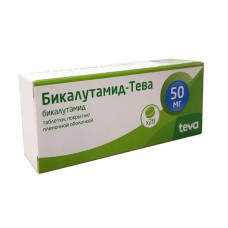Expiration date: 11/2027
The composition and form of issue:
Tablets, film-coated. 1 tablet contains:
bicalutamide 50 or 150 mg
other ingredients: microcrystalline cellulose povidone (PVP K-30) croscarmellose sodium sodium lauryl sulfate lactose monohydrate silica colloidal anhydrous magnesium stearate shell Opadry OY-GM-28900 white (hypromellose 2910 15?? (?464), Polydextrose (?1200), titanium dioxide, macrogol 4000)
blister of 7 or 10 PCs. in cardboard pack 4 or 3 blisters.
Description pharmaceutical form:
50 mg tablets: white or almost white, round, film-coated, engraved with "93" on one side and "220" on the other.
Tablets 150 mg: white or almost white, round, film-coated, engraved with "BCL" on one side and smooth on the other.
Pharmacokinetics:
Once inside quickly and completely absorbed from the gastrointestinal tract. Eating does not affect the absorption.
(S)-enantiomer is eliminated from the body much faster (R)-enantiomer, T1/2 last about 7 days.
In case of daily administration of bicalutamide, the concentration of (R)-enantiomer in the plasma is increased about 10 times due to the long half-life, making possible the drug 1 time per day.
With a daily intake of bicalutamide at a dose of 50 mg equilibrium concentration of (R)-enantiomer in plasma is about 9 mcg/ml While receiving 150 mg bicalutamide daily equilibrium concentration of (R)-enantiomer is approximately 22 µg/ml At steady state of about 99% of all circulating in the blood of enantiomers is active (R)-enantiomer.
On the pharmacokinetics of (R)-enantiomer are not influenced by age, impaired renal function, mild and moderate hepatic impairment. There is evidence that patients with severe impaired liver function slows elimination of (R)-enantiomer from plasma.
The plasma protein binding is high (for racemic mixture of 96% for (R)-enantiomer — 99,6%). Extensively metabolized in the liver (by oxidation and formation of conjugates with glucuronic acid). Metabolites are excreted with urine and bile in approximately equal proportions.
Description pharmacological action:
Bicalutamide is a racemic mixture of nonsteroidal antiandrogenic activity predominantly (R)-enantiomer has no other endocrine activity. Bicalutamide binds to androgen receptors without activating gene expression, suppresses the stimulating effect androgenov. The result is a regression of malignant tumors of the prostate. In some patients, discontinuation of bicalutamide can result in the development of the clinical syndrome of androgen.
Indications:
- common prostate cancer in combination with GnRH analogue or surgical castration
- locally advanced prostate cancer (TK–T4, any N, M0 T1–T2, N+, M0) as monotherapy or adjuvant therapy in combination with radical prostatectomy or radiotherapy
- nemetstaticescoy locally advanced prostate cancer in cases, when surgical castration or other medical intervention is not applicable or inappropriate.
Contraindications:
- hypersensitivity to bicalutamide and auxiliary components of the drug
- concurrent administration with terfenadine, astemizole and cisapride
- the drug should not be administered to children and women
- lactose intolerance, lactase deficiency or malabsorption of glucose-galactose.
Caution: impaired liver function.
Side effects:
Pharmacological action of bicalutamide may cause the following side effects:
- very often (>10%) — gynecomastia (may persist even after cessation of therapy, especially in the case of the drug for a long time), breast tenderness, tides blood to a person, decreased libido, sexual dysfunction
- frequently (>1% but <10%) 150="" p="">
- rarely (>0.1% but <1%) 150="" p="">
- very rare (>0,01%, but <0,1%) 150="" -="" p="">
While the use of bicalutamide and GnRH analogues may also experience the following adverse events with a frequency >1% (causal relationship to drug intake is not installed, some of the reported side effects were found in elderly patients).
From the side of cardiovascular system: heart failure, angina, conduction disorder, including prolonged PR and QT intervals, arrhythmias, nonspecific ECG changes, increased blood pressure, myocardial infarction, syncope.
From the digestive system: gastric bleeding, anorexia, dry mouth, dyspepsia, constipation, flatulence, periodontal abscess, cancer of the stomach/intestine.
From the nervous system: dizziness, headache, insomnia, anxiety, somnolence, neuropathy.
The respiratory system: shortness of breath, chest pain, cough, pharyngitis, bronchitis, pneumonia, rhinitis, bronchospasm, nasal bleeding.
From the urinary system: nocturia, dysuria, retention of urine, swelling, frequent urination, hydronephrosis, infection.
From the side of hematopoietic system: anemia.
The skin and its appendages: alopecia, skin rash, sweating, hirsutism, dry skin, herpes zoster, skin cancer.
From the musculoskeletal: myasthenia, myalgia, cramps, arthritis, contractures of the joints, pains in the bones, cramps in the legs.
From the laboratory parameters: hyperglycemia, increased alkaline phosphatase, hypercreatininemia, hypercholesterolemia, hyperbilirubinemia.
Other: diabetes, polyuria, increase or decrease in body weight, pain in the chest, abdomen, pelvic area, sexual dysfunction, tumor growth, chills, dehydration, gout, cataract.
Drug interactions:
No data on pharmacodynamic or pharmacokinetic interactions between bicalutamide and GnRH analogues.
In vitro studies showed that (R)-enantiomer of bicalutamide inhibits CYP 3A4, and to a lesser extent affecting the activity of CYP 2C9, 2C19 and 2D6. Potential ability of bicalutamide to interact with other drugs not detected, however, when used for 28 days in patients receiving midazolam, midazolam AUC increased by 80%.
Incompatible with terfenadine, astemizole, cisapride.
Caution must be exercised in the appointment of bicalutamide at the same time with ziklosporinom or blokatorami calcium channels. You may need a lower dose of these drugs, especially in the case of potentiation of the effect or the development of side effects. After the start of use or withdrawal of bicalutamide is recommended to closely monitor the concentration of cyclosporine in plasma and the clinical condition of the patient.
Simultaneous administration of bicalutamide and drugs that inhibit microsomal oxidation of drugs, such as cimetidine or ketoconazole, may lead to increased concentration of bicalutamide in plasma and may increase the incidence of side effects.
Enhances the action of anticoagulants of the cumarin series, including warfarin (the competition for the relationship with the squirrels).
Method of application and dose:
Inside. Adults (including elderly) men.
In advanced prostate cancer in combination with GnRH analogue or surgical castration, 50 mg 1 time a day. Treatment with bicalutamide-Teva must start simultaneously with the beginning of reception of GnRH analogue or surgical castration.
In locally advanced prostate cancer — 150 mg 1 time per day. Bicalutamide-Teva should be taken long-term, at least for 2 years.
If signs of disease progression, the drug should be discontinued.
The impaired renal function: dose adjustment is not required.
The hepatic impairment: in mild hepatic impairment dose adjustment is not required. In patients with moderate and serious disturbances of liver function may experience increased accumulation of Bicalutamide-Teva.
Overdose:
Cases of overdose in humans have not been described.
Treatment: specific antidote exists. Treatment is symptomatic. Dialysis is not effective because bicalutamide binds strongly to proteins and is not excreted in the urine unchanged. Shows a General supportive treatment and monitoring of vital body functions.
Special instructions:
Given the possibility of slowing down the excretion of bicalutamide and its accumulation in patients with impaired liver function, it is advisable periodically to evaluate liver function.
Most of the changes in liver function occur during the first six months of treatment bicalutamide-Teva.
In the case of pronounced changes in liver function receiving bicalutamide should be discontinued.
In patients with progression of disease against the background of increasing the level of prostate specific antigen (PSA) should consider discontinuing treatment with the drug bicalutamide-Teva.
When you assign Bicalutamide-Teva patients receiving anticoagulants cumarin series, it is recommended to regularly monitor PV.
Patients with lactose intolerance should be informed that each tablet of Bicalutamide-Teva 50 mg contains 35 mg of lactose monohydrate tablet 150 mg contains 105 mg of lactose monohydrate.
Given the possibility of bicalutamide inhibiting the activity of cytochrome P450 (CYP 3A4), caution should be exercised with concomitant administration of the drug bicalutamide-Teva with drugs primarily metabolized with the participation of CYP 3A4.
Bicalutamide is contraindicated in women and must not be administered to pregnant and lactating mothers.
Effects on ability to drive a car or operate machinery. During the period of treatment must be careful when driving and occupation of other potentially hazardous activities, require high concentration and psychomotor speed reactions.
Storage conditions:
(in sealed package).



